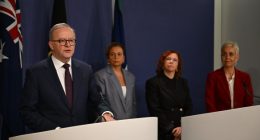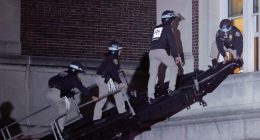
Director Daniel Roher has been keeping his latest documentary under wraps for long enough that he still forgets that he can openly talk about it. “I have to be like, oh right, it’s not a state secret anymore,” he says.
Roher is the filmmaker behind Navalny, the doc that the Sundance Film Festival revealed Monday as the “mystery movie,” as the festival described it, on this year’s virtual lineup. The film, which is receiving its world premiere at Sundance, follows Alexei Navalny, the Russian government opposition leader who was targeted in an assassination attempt in August 2020. After an emergency evacuation from Russia, Navalny received treatment in Germany, during which time it was revealed he had been poisoned with the toxic nerve agent Novichok. The European Union later determined that Navalny’s poisoning “was only possible with the consent of the Presidential Executive Office” of Russia. The Kremlin has long denied involvement in the poisoning.
Roher, who screened his last doc Once Were Brothers: Robbie Robertson and The Band at the Toronto International Film Festival, met Navalny in November 2020, some three months after the political activist’s poisoning. The director began filming the day after that first meeting, with principal photography lasting until Navalny was jailed upon his return to Moscow in January 2021, leaving Roher and his editors with nearly 500 hours of footage.
CNN Films and HBO Max partnered to acquire the film, with Navalny set to be broadcast in North America on CNN before being made available on streaming services HBO Max and CNN+.
In his first interview about the film, Roher talked to The Hollywood Reporter ahead of the documentary’s Sundance debut.
How did you first meet Alexei?
It’s kind of an epic story in and of itself. I found myself working on a project with a few colleagues, and we were in Ukraine. And, lo and behold, that project didn’t work out, and I found myself in Vienna, Austria, in limbo. It was lockdown. [I was] not sure what I would be doing, not sure if there was a film to make, not sure if I’d be going back to Canada. And that’s when one of my colleagues, a journalist who I was working with named Christo Grozev, said to me, ‘I’m sorry, we can’t go back to Ukraine right now, but there’s something else. You know that Navalny guy?’ I said, ‘Yeah, I know that Navalny guy.’ And he said, ‘I think I have a lead in who tried to poison him.’ As a documentary filmmaker, my ears immediately perked up, and a week later Christo and Odessa Rae, one of the producers of the film, and myself were sitting across from Alexei in this little room in the Black Forest.
Had they agreed to the idea of making a documentary before that meeting?
They had not agreed to do anything. What we understood going into that meeting is that they were open to the idea of having a documentary made, and we were just fortunate enough that we were there. We could get there in 12 hours in a car. My understanding, and I had no concept of this when we went there, but I learned later that Alexei and one of his chief investigators, they were conceiving of a documentary project. I later learned that when Alexei woke up from his coma in Berlin, he had two visions: One was of doing this gigantic investigative video about Vladimir Putin’s palace and his illicit wealth. And the other was to do this big, in his mind, Hollywood documentary movie. So they were open to the idea, they were open to the concept.
In that first conversation, did they tell you what they were hoping to get from a documentary?
Yeah, it was hilarious. Alexei Navalny was like, “We want big documentary film and we wanted to be like Tiger King. Love Tiger King. Let’s make something amazing like this.” And I was like, “Uh, yeah that’s not really my style of filmmaking.” I think Navalny had in his mind what it might be like to make a big documentary, but it was certainly different from my conception and how I worked. So, that meeting right from the beginning seemed and felt very collaborative, where they expressed their expectations and hopes and ambitions for a possible documentary film, and I expressed sort of what I need and how I work.
How long did you film with Navalny?
Essentially, three months. This is what it is to be a documentarian. When you fall into something like this, you have to charge into the unknown with every morsel of energy, strength and passion that you have on offer. We had no concept of how we would get this film made. We had no concept of how we would get this film financed. We just knew we had had to keep shooting.
What did you want to show in this movie that audiences haven’t seen in news reports or on Navalny’s own social media?
From the very inception of this project, I had to be hyperaware of the fact that I was making a documentary about a politician who’s not just a normal politician, but a politician that is a master of social media. A master of commanding the media and manipulating the media for his political aims and ambitions. And I had to be acutely aware of that as we were making this film. And I think that struggle, that dialogue is present throughout the movie. I wanted to make it very clear in the film that this was an objective documentary we were making about him. Ultimately, I think Alexei enjoyed being the subject of a documentary, and you know, this is an overwrought cliche, but trust is a critical part of the relationship. I think that we really understood one another.
What was the most shocking thing you think you captured while filming?
The most extraordinary moment for me filming the movie was when Alexei conceived of this idea that he would call up members of the team that was responsible for his would-be murder and essentially prank them. [I thought] it might be an interesting set piece of the movie, and we’ll shoot it just to shoot it, but professional spies — Russian hitmen who work for the government — aren’t morons. They’re not just going to spill the beans to some schmuck on the phone. I don’t speak a word of Russian, so it’s critical to understand that during those phone calls I didn’t understand a word that was being spoken. But I understood everything. I see how intense these Russian people [are] who do not emote and their jaws are unhinged and they are in a state of disbelief. I remember just being like, “OK, make sure we’re rolling, keep it in focus. This is the most important thing you’ll ever film in your entire life.” And then afterward everyone was freaking out. We were running around like chickens with their heads cut off. I was like. “Let’s offload the footage right now. Should we call the police? Do we need protection at the house?” It was this extraordinary moment that was the beginning of an 18- or 20-hour shoot day.
Navalny did release the footage of that phone call on his social media. What is your footage giving to audiences they haven’t already been able to see?
That footage has been seen 35 million times, and I think that 34 million of those views have been on Russian YouTube. I think a lot of people in the West who will be engaging with this film actually don’t know this story. For those who do, I think the most amazing part for our audience members who’ve maybe seen it in the context of Alexei’s YouTube page is what comes after the call.
How did you go about finding distribution?
This is a really scary movie. This is a really scary story. I think it was frightening for a lot of people. If you want to do business in Russia, this is a film that was radioactive. You could not go near it. We understood that we had to have partners who appreciated the magnitude of what we were trying to accomplish, but were not afraid of the undertaking.
Did you ever feel unsafe during production?
I was paranoid. I remember there was one moment when I flew home to Canada for a couple of days in the middle of production, when we were in the middle of shooting principal photography. And I was in my little apartment in Toronto, and I was transferring footage all day. And I went for a jog and I was like five blocks from my apartment and I was like, “Every hard drive’s in my apartment right now.” I just chill right up my spine and I’m like, “What if the guys at the Russian embassy have been keeping eyes on me and they know I went for a run?” And so I ran back. But in terms of my personal security and my personal safety, it was really hard for me to be scared or fearful when I’m standing next to the bravest man on Earth.
Do you or anyone on your team actually run into any security issues?
We were very careful. We had a lot of security protocols, and we tried our best to be very careful. I haven’t sent an email in a year. Everything we’ve been doing has been over Signal and encrypted messages. I think that if we ran into security issues, we might not know about it. But there’s been no indication that that’s been the case. And I think a lot of it has to do with how careful our practices were.
You mentioned the possibility of the doc reaching Western audiences that may be less familiar with Alexei and what came after his poisoning. Did you have that audience in mind during production?
What answers that question is the fact that when Alexei gave his interview, he did it in English. What that indicates is that I think he was speaking to a Western audience. But at the same time, I really think a Russian audience, an Eastern European audience, will enjoy the film just as much. I’m a Canadian; I don’t speak Russian. Just that reality of me making the movie orients the film to a Western audience.
I am assuming that Alexei will not be able to watch the documentary. But have you gotten any feedback from his team?
Navalny had an Instagram post a few weeks ago where, when he announced the film, he joked that the prison library does not have an HBO Max subscription. He won’t get to see it for a long time, but everyone else in his team, the key roster of team members, have seen the documentary at this point, as well as family members. I think there are moments in the film that are a bit uncomfortable for some of the staff, but ultimately I think everyone felt that it was a deeply humanizing portrait.
Navalny is in jail now but, should his situation change, is this a story you would go back to?
Like, a sequel?
Yes, I guess it would be a sequel.
The sequel that I wanna make, which I might have to shoot in 10 or 15 or 20 or 25 or 30 years, is the story of a single day in Russia where there is an inauguration for President Navalny.
Interview edited for length clarity.
Source: Hollywood





